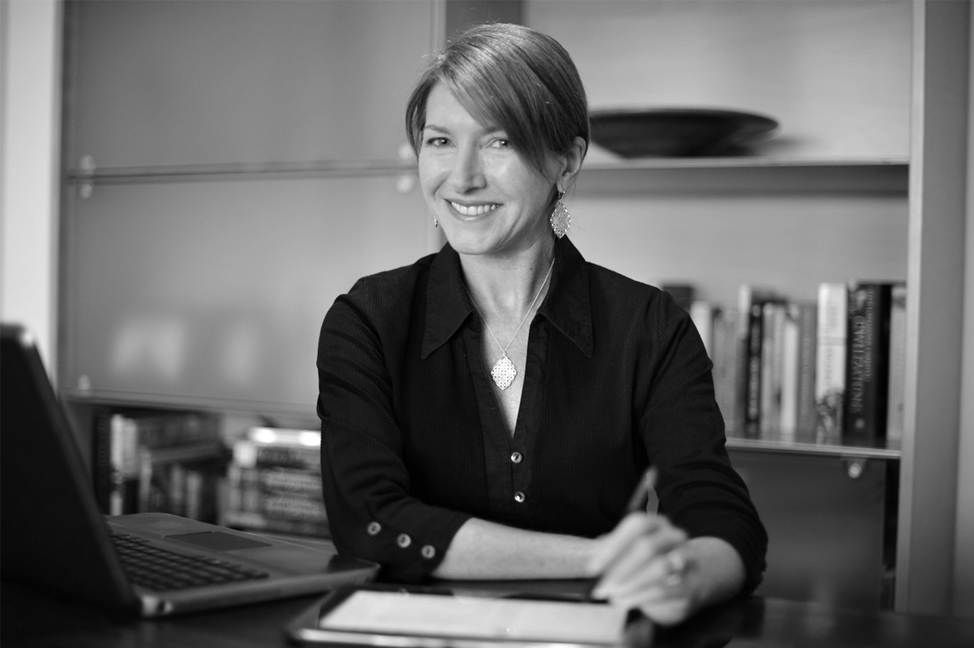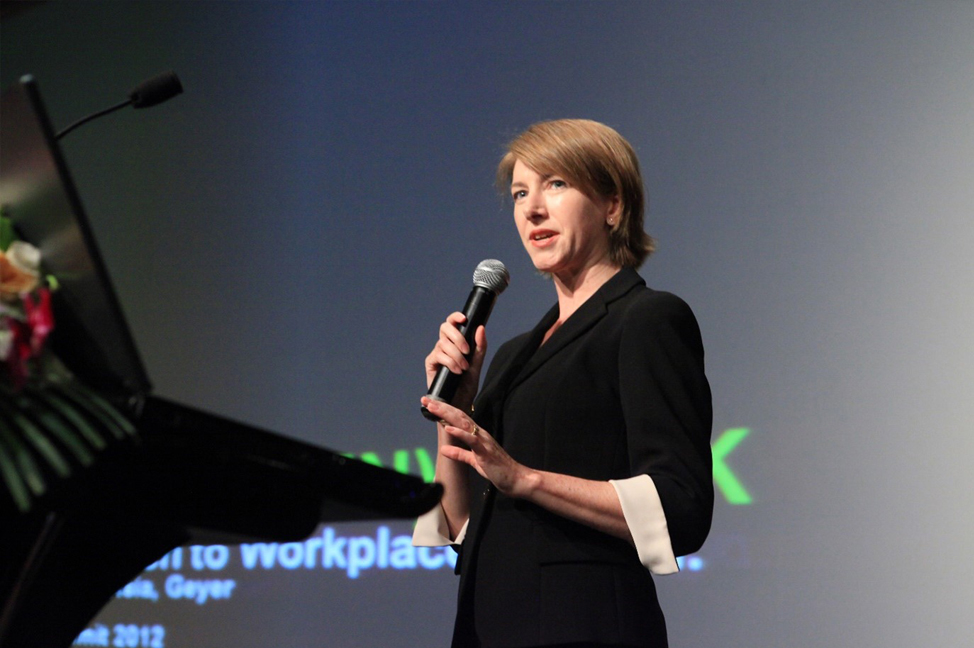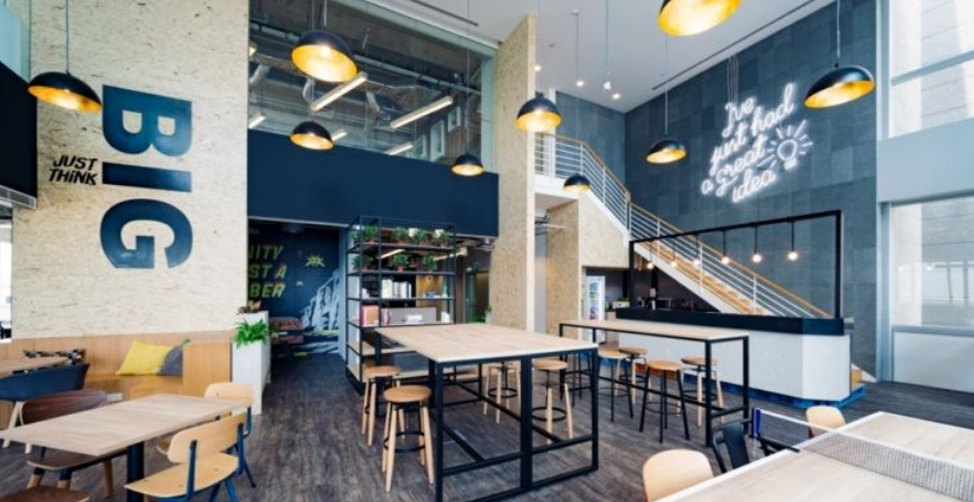29 November 2019

Dr Caroline Burns
Founder & Managing Director, Workplace Revolution
Bachelor of Business (Property)
A self-described “serial entrepreneur and technology nerd”, Dr Caroline Burns has dedicated her professional life to providing corporate clients with bespoke advice in envisioning future business and workforce scenarios in the digital age across the Asia-Pacific region.
Workplace Revolution – a consultancy service intelligently transforming workplaces – is Caroline’s third business established in her fast-paced, consultancy career as a highly sought-after leader in the workplace and workforce profession.
She and her team identify and optimise opportunities for the transformation of “work + place” for competitive advantages in a company’s often cutthroat and saturated field.
Most of the world’s population (58%) spend one-third or 90,000 hours of their adult life at work (World Health Organisation), contributing greatly not only to an individual’s wellbeing, but societies at large and their effectiveness.
“We believe workplace matters and that an intelligently created workplace is a powerful business tool for supporting employee engagement, productivity and effectiveness,” Caroline says.
“It connects people to the purpose and values of the organisation, supports culture, and can be a powerful statement of identity.”
“All our clients in one way or another are grappling with the inherent tensions between aspiration versus operational capability, employee effectiveness versus experience, consistency and scalability versus customisation and personalisation, present functionality versus future flexibility, and increasingly, control of versus access to resources.”
“In essence, organisations are challenged to ensure they extract maximum value (in their terms) from their limited workplace resources.”
And that’s where Caroline and Workplace Revolution come in.

Caroline originally decided to pursue a career in property development and real estate – earning a Bachelor of Business (Property) from UniSA – as it combined her love of design and architecture with her mathematics capabilities and knack for business.
After securing a fulltime job before her final exams as a Facility Planner at Woods Bagot, Caroline thrived on the variety, independence and trust that came with consulting for clients across the eastern seaboard which would set her up in good stead for her future professional career.
However, as an innate traveller and explorer, Caroline had her sights firmly set on Asia (even her final year thesis analysed the investment trends of Asian direct investment in Australia), so after a few attempts to relocate didn’t materialise, she seized opportunities to firstly to do projects in Asia, then permanently relocated to Singapore to establish and grow the Geyer workplace design and strategy business in Asia.
She hasn’t left since, finding the fast-paced, competitive and innovate mindset of Asia the perfect environment for Workplace Revolution.
“I love Asia because it’s incredibly diverse and a magnet for interesting, intelligent people from all over the world,” Caroline says. “Everything here happens two to three times as fast compared to Australia, and often on tighter budgets, so it forces you to approach client service and business operations differently.”

“It also suits my professional values and style as its very relationship and reputation driven – more so than Australia. If you invest in relationships and build trust you will have a solid foundation for long-term success.”
Caroline and her company as a result have carved out a brilliantly successful niche in the Asian market transforming and modernising a myriad of companies from Asian family-owned agglomerations to Fortune 100 organisations.
Continually seeking out opportunities to explore different aspects of “work + place” in the evolving digital economy, Caroline says the competitiveness of Singapore and Hong Kong being global hubs is constantly inspiring.
“You are always challenged to innovate and take calculated risks which I love – it’s never boring here!”
“I believe Asia will be a leader in the innovations that will profoundly influence the way we work and create communities. I am passionate about exploring how these changes may affect the environments in which we will work, live and play as well.
“I certainly never anticipated early in my career that this would be my ‘calling’, but I love the variety and independence, the opportunity to build longterm relationships within the profession, and the ongoing learning and accumulation of knowledge that is essential for any reputable consultant.”
The future of the workplace
Dr Caroline Burns is widely recognised as an independently-minded leader in the workplace and real estate profession and has written and presented extensively on a wide range of business topics.
As one of the foremost trusted experts and advisers in work + place transformation and organisational design, her extensive experience is sought-after by clients and colleagues worldwide.
Below we’ve asked her some questions and advice about workplace effectiveness and the future of work.
1. Could you take us through some workplace trends and changes you have seen in your career and what you believe we will be seeing in the near future?
Great workplaces are tuned into the unique mix of roles and types of people in an organisation and approach the environment holistically. Ensuring employees are engaged and know what to expect and that managers understand how to lead by example, investing in technology training and reinforcing office etiquettes (especially for open team areas) are essential ingredients for success.
I started my career in a private office in a prestige building in Adelaide, and now I work from anywhere and everywhere that work takes me around the world. By some measures I have therefore ‘lost’ a lot in twenty-five years, but to my thinking I have gained enormously; I don’t have a dedicated office, I get to wear jeans not just on Fridays, I travel light and am constantly in touch with everyone I need to be connected with – and I find inspiration everywhere that nourishes our teams’ innovative and entrepreneurial spirit.
This is why I am loving this period of time on the brink of the digital age and see enormous opportunity to reimagine the typical ‘day at the office’ with our Clients and colleagues. It took most of my career to go from a private office, desktop PC and a suit, to jeans, a smart phone, and a favourite work café in every city
Successful organisations in the new economy will use digital capabilities to improve processes, engage people and drive innovation. They will make it easier for people to get work done and focus on what matters by overhauling work practices, policies, systems, and processes, and by driving a culture of trust and empowerment.
I am hopeful these business trends will bring more of a focus on how workplaces perform, not just how well they photograph!
I advise our Clients to be inspired but not blinded by other organisations’ ‘instagrammable’ workplaces and current ‘design trends’. Be smart and dig into why the space works for them (and what doesn’t work) – are there parallels to your organisation or too many differences? Organisations and people are unique, dynamic, complex and reactive – your new workplace needs to be the same.

2. What do you think of the flexibility of the modern workplace, including trends like the rise of working remotely, open plan offices, and swapping formal spaces for hot desks and coworking spaces?
I’ve written and presented extensively on these topics (see my website or LinkedIn), so it’s hard to keep this short. I’ll just leave you with two quotes from recent articles that summarise my perspective:
These are examples of the trend towards the ‘on-demand’ workplace or ‘workplace as a service’ in response to the increasing need for flexibility, scalability, customisation and collaboration. This ‘trend’ is continuing to evolve in different directions in response to changing organisational and worker needs and preferences, and to different real estate/business contexts in different regions of the world.
There have been many articles recently (credible and not so credible) describing the negative effects of ‘open plan offices’ on productivity and experience in the workplace. But this is the wrong debate. Setting aside the fact that ‘open office’ is a very broad term that encompasses a hugely diverse range of workplace designs, like many things in life when done excessively it can be bad for you, but used in moderation in the right context for the right purpose, ‘open plan’ has a place in the workplace toolkit.
We should resist the temptation to get caught up in the ‘open plan is the enemy’ debate, instead of reviewing the facts available and applying these rationally to advance the quality of decisions about work environments. How we combine and apply the settings in the workplace toolkit can have a negative – even if unintended – influence on team effectiveness, so it is incumbent on advisers and influencers to avoid 'groupthink' and apply evidence from other workplaces thoughtfully.
Open plan environments may indeed be the enemy of workplace effectiveness and employee experience in many situations, but let's ensure we don’t make critical workplace decisions based on 'fake news'.
Conversely, coworking spaces challenge people to unlearn their old thinking around work,individualism and control. In this way, the coworking movement can help shift our relationship with work to be one that is more purposeful, collaborative, holistic, and self-directed.
This is the attitude people and organisations will need if they are going to successfully navigate the new economy. Human resources and corporate real estate leaders need to be part of the future of work discussion within their organisations, encouraging multi-disciplinary approaches to enabling great people to do great work. Increasingly, this work will be distributed across space and time, drawing on physical and digital resources, and access to people, inside and outside the control of the organisation.
3. What role do you think Artificial Intelligence will play (or is already playing…) in the future of our workplaces and professional life?
Change and technological innovation is not new in business. What is different about the period we are in now, compared to the dawn of the internet age at the start of my career, is that the rate and complexity of change, and the VUCA (volatility, uncertainty, complexity and ambiguity) environment in which it is occurring means that the stakes are higher for everyone.
AI is still at the level of automation, robotics and machine-learning within fairly narrowly defined fields, experts suggest it will be a while before we have ‘general AI’ which could make a lot more jobs redundant.
So, for at least the next decade I believe knowledge workers will increasingly work with AI rather than be displaced by it, enabling us to focus on creative, collaborative, coaching and learning capabilities. For example, there is increasing investment in virtual assistants (such as Alexa for Business) and augmented reality in the workplace.
This means the places we work need to support these activities more effectively, especially constant, on the job learning and capability development. The internet of things and development of ‘smart buildings’ and ‘smart cities’ will also give rise to workplaces that are more intuitive, responsive, and hopefully healthier.
4. What are you most important insights you have discovered through your work that make a happy, successful business and workplace?
Trust and its opposite side, accountability.
It’s the foundation of everything good that follows.




